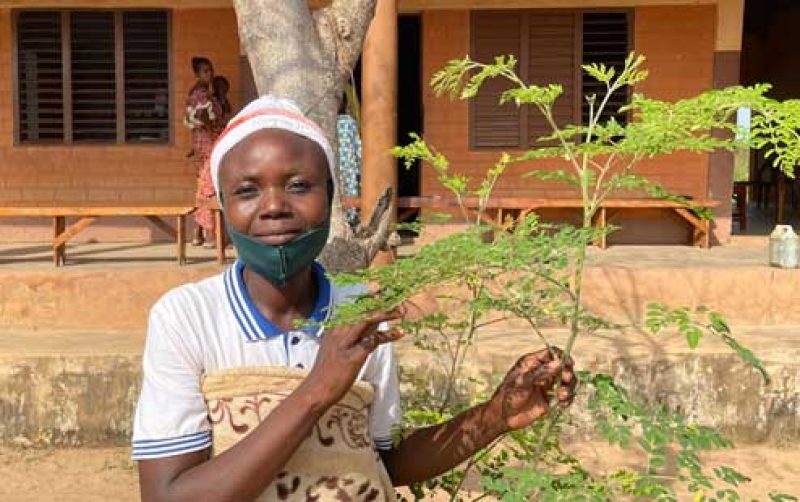- Tarique visits National Martyrs’ Memorial, pays homage to martyrs |
- Muslim League leads new electoral alliance, Jatiya Muslim Jote |
- Tk 500cr Drive to Turn Haor Fallow Land Into Farmland |
- Tarique Rahman returns home amid rapturous reception |
- Home After 17 Years: Tarique Returns to Gulshan Residence |
New UN team of experts for the resilience of food systems

Food security - Manou Gounou, a volunteer trainer for food security, stands with a moringa plant at Gbegourou Epicenter in Benin in 2021.
Rome – Dec. 4, 2024. The High Level Panel of Experts on Food Security and Nutrition (HLPE-FSN) of the Committee on World Food Security (CFS) has announced a new team of researchers to join the Panel for the report “Building resilient food systems”, to be presented at the 53rd Plenary Session of the CFS in October 2025.
The HLPE-FSN is the United Nations body assessing the science related to global food security and nutrition and Alison Blay-Palmer, the UNESCO Chair on Food, Biodiversity and Sustainability Studies at Wilfrid Laurier University, will lead a writing team of food systems experts from around the world. Their collective experience spans health and nutrition, human rights, gender analysis, traditional Indigenous knowledge and environmental sciences, ensuring a comprehensive understanding of agricultural and food system vulnerabilities. The other members of the team are:
• Colin Anderson, Associate Director, Institute for Agroecology, University of Vermont, Canada.
• Philip Antwi-Agyei, professor, Kwame Nkrumah University of Science and Technology, Ghana.
• Garima Bhalla, economist at the Food and Agriculture Organization of the United Nations.
• Lídia Cabral, social scientist at the Institute of Development Studies (IDS), UK.
• Francisco Javier Espinosa Garcia, Professor of Ecosystems and Sustainability, Universidad Nacional Autónoma de México.
• Tomaso Ferrando, professor, University of Antwerp Faculty of Law and Institute of Development Policy (IOB), Belgium.
• Isabel Madzorera, professor in Public Health Nutrition, University of California, Berkeley, USA.
• Tammara Soma, professor in Resource and Environmental Management, Simon Fraser University, Canada.
• Monika Zurek, professor at the Environmental Change Institute at the University of Oxford, UK.
“This process will help to define resilient food system transformation for policymakers and countries in the years to come,” said Blay-Palmer, a professor of Geography and Environmental Studies at Laurier. “The report can provide a way forward for more equitable resilience across multiple dimensions of food systems.”
Blay-Palmer is the founding director of the Laurier Centre for Sustainable Food Systems and a member of the Royal Society of Canada’s College of New Scholars. Together with 35 partner organizations across four continents, she is currently leading the Food Learning and Growing (FLOW) Partnership. Over the next six years, FLOW research will map and monitor specific practices that are driving sustainability on a regional level and amplify them to influence meaningful, long-term policy decisions globally.
The first draft of the report will be publicly released for public consultation in January 2025.
The HLPE-FSN reports are widely used as reference documents within and beyond CFS and the UN System, by the scientific community as well as by political decision-makers and different stakeholders at international, regional and national levels.
The HLPE-FSN draws its studies based on existing research and knowledge already conducted by various expertise-providing institutions and adding value by global, multi-sectoral and multidisciplinary analysis, and translates the richness and variety of forms of expert knowledge from many actors that draw on both local and global sources, into policy-related forms of knowledge. – Press release

